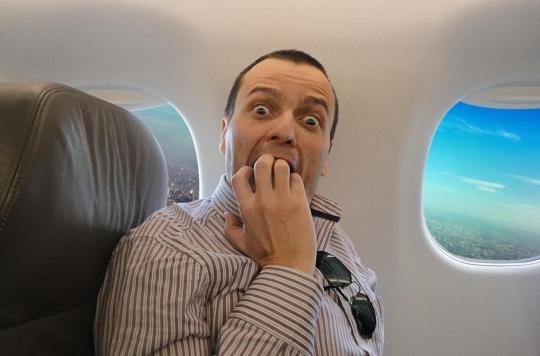With the arrival of the summer holidays, hundreds of thousands of people dread the idea of getting on a plane. Where does this phobia come from and how to get rid of it?

That’s it, the summer holidays have finally arrived and thousands of French people are getting ready to take the plane to escape their daily lives in view of more exotic destinations. But for many of them, the trip will not be a cakewalk. Indeed, according to a survey carried out last summer by the Voyages Pirates website, 56% of French people are afraid of flying. And if for some it is a slight anxiety when taking off or landing, for others it is a real phobia. Where does it come from and how to deal with it?
The fear of the plane, aerodromphobia of its scholarly name, can draw its sources from simple unpleasant memories. Thus, the experience of complications before or after the plane trip (flight or RER delay to go to the airport, strikes, lost luggage… the list is long) can lead to anxiety about departure, which will continue to grow. during travels.
To this may be added claustrophobia or the terrifying feeling of lacking control once in the air. Passive, sitting on a seat for hours, you put your life in the hands of the pilot, a complete stranger who you don’t even see. And no matter how much we repeat ourselves back and forth and across that the statistics work in our favor (one fatal plane crash for 2.54 million flights), flying is not natural for humans, repeats the brain, convinced that if there is a problem, the only possible outcome is death. The media coverage given to the crashes obviously does not help. Thus, your amygdala, part of the brain which manages the emotion, sends you the signals of a significant danger, explains the website of the Fear of Flying Treatment Center (CTPA).
Flight simulators, a very popular technique to better understand the plane
But do not panic, this phobia is not inevitable. Provided you face the problem and devote the necessary time to it, aerodromphobia is one of the fears from which patients recover best, say specialists. First of all, it will be a question of garnering as much knowledge as possible about aeronautics. “Fear often comes from the unknown. Most people don’t know how an airplane flies and that worries them. I’m sure that fear decreases with knowledge,” explains the Figaro Marie-Claude Dentan, retired psychologist and co-founder of the Air France Anti-stress center.
Once this knowledge is stored in your brain, you will need to apply cognitive techniques to re-ignite the cortex and soothe the crazed amygdala. To do this, you can, for example, use a flight simulator to put yourself in a situation in the cockpit. “As a passenger, when you understand why the pilot makes turns or when you know what he is doing during turbulence, the situation becomes much easier to accept”, explains the CTPA which organizes courses in several French and European cities for the sum of 430 euros.
Regulate your heartbeat
For 250 euros more and in the same logic of trivializing as much as possible the mysterious environment that the plane can be, the Air France Antistress center also offers two hours of flight simulator. These follow a personalized interview with a psychologist and a meeting with members of the crew who will give you theoretical lessons on the plane. Other specialists recommend carrying out real flights in order to become better aware of the phenomenon.
However, there are fortunately much less expensive techniques. “Sleep well the days before the trip, try to have a pleasant journey before the flight by avoiding stressful environments like the RER. You can also go for a walk in the airport a few days before to confront the place. And above all, it is important to play cards on the table by warning the flight attendants of their fear”, explains to Le Figaro Christophe Bagot, psychiatrist specializing in anxiety disorders.
Velina Negovanska, psychologist specializing in stress management, co-author of the book I am no longer afraid of flying! and founder of the CPTA offers breathing exercises to control your heart rate and therefore regulate your stress independently.
Face your fear well before departure
And if you favor therapy over internships, don’t wait until the last minute to hope to resolve your phobia. “In 10 days it is impossible to perform miracles. This requires a therapy of about 10 months. Because if we stay on the surface, there is a risk of relapse”, explains Christophe Bagot.
But it unfortunately happens that, as a departure approaches, the therapy has not had time to bear fruit and the patient is the victim of a completely paralyzing fear. The specialist then recommends a mild anxiolytic treatment to be taken on an ad hoc basis during the journey. Not to be mixed with alcohol of course.

.














